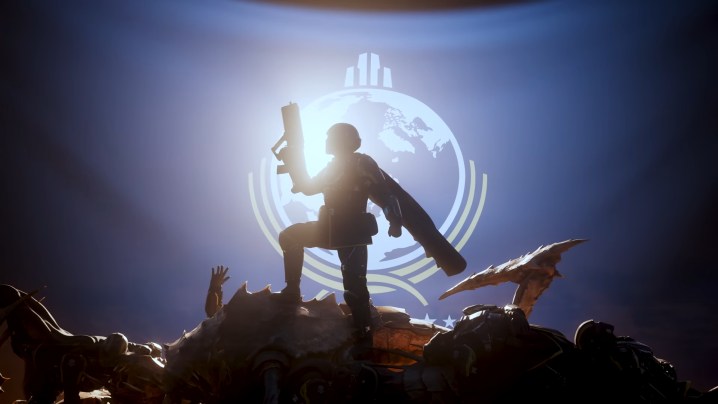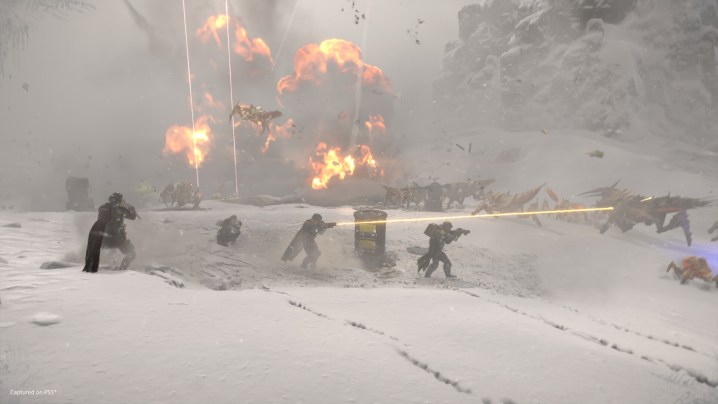
Helldivers 2 was on top of the world. Released in February to surprise acclaim, PlayStation and Arrowhead’s co-op shooter quickly became the kind of success story that any gaming company would want to emulate. In a world of live service risks, this one was paying off thanks to a dedicated community whose commitment to democracy showed no signs of slowing down.
Then it all came crashing down in an instant.
On May 3, developer Arrowhead revealed that it was implementing a change that would force Steam players to link a PlayStation account in order to keep playing. It seemed like a small enough ask on paper, but the move came with unintended consequences that left players furious. After a hectic weekend filled with review bombing, refunds, and harassment aimed at its developers, PlayStation stepped in to reverse its decision and, hopefully, save its golden goose.
That chaotic sequence of events should serve as a teaching moment for any publisher eyeing live service games. Even the rare successes aren’t foolproof cash cows; the high reward comes with even higher risks.
Betting on live service
On paper, Helldivers 2 had done everything right since its release. For starters, it was anchored by strong third-person shooting and thoughtfully implemented co-op play. That core gave PlayStation and Arrowhead a lot of flexibility that other games like it don’t always have. It allowed them to charge $40 for it rather than pushing it as a free-to-play game and still thread in paid microtransactions. Even a buggy launch filled with server issues couldn’t hold it back. These are things that have torpedoed plenty of games in the past, but Helldivers 2 was unusually strong.
Great gameplay is part of the equation, but there are a few other factors to consider. For one, it’s a live service game that showed players it had a plan for the future. Arrowhead has a Dungeons and Dragons-like Game Master on its staff who shapes the direction of its story live in response to players. It’s not the kind of game where you need to sit around waiting for a DLC to see what’s next. Arrowhead showed it was committed to keeping things fresh. That helped it build a loyal fan community that was ready to defend the company’s every move.

These are the exact things that every publisher prays for when releasing a live service game — but few actually achieve them. Just look at other less successful attempts this year like Ubisoft’s Skull and Bones and Square Enix’s Foamstars. Both failed to elicit the same reaction, leaving their futures less certain. It might leave you asking why either company would take such pricey gambles, but Helldivers 2 showed why some missed shots can be worth the effort. When you get a game that hits, one that keeps players pumping in time and money consistently, it’s a publisher’s dream come true.
Hard lessons learned
But a successful launch is just one battle in a long war, and Sony learned that the hard way. The trouble started when Arrowhead announced that PC players would need to link their PlayStation accounts to keep playing. It was a controversial change right away, with some players noting that they didn’t trust Sony’s notoriously leaky security. It wasn’t long before a more serious issue emerged, though. Players quickly pointed out that PSN isn’t available in several countries, which meant that those who bought the game would be locked out of it once the change went into effect.
The dominoes fell from there. The game was delisted from 170 countries, cratering its potential player base. A wave of “overwhelmingly negative” Steam reviews followed. More extreme fans took to social media to harass Arrowhead employees and aim ire at its community managers, despite the fact that it appeared to be a top-down PlayStation decision that Arrowhead had little say in. Public sentiment turned on a dime, tarnishing a beloved game’s reputation instantly. Order was seemingly restored once PlayStation reversed its plans a few days later, but PlayStation is now left with some hard lessons.

While publishers pray for success like that of Helldivers 2, this is the other side of that live service coin: It’s an unforgiving business model. One bad decision is all it takes to destroy a successful game’s momentum. Just look at last year’s Payday 3. Though its predecessor was a massive hit with a dedicated community, the threequel’s always-online requirement left fans feeling burned. That decision was worsened by a launch plagued with server issues, during which the game could not be played for the better part of its first few days. Payday 3 still hasn’t recovered from that moment. Its Steam reviews are “mostly negative” and its player base is anemic compared to that of Payday 2. That’s the kind of stressful tightrope act that publishers commit to when chasing the live service dream.
Helldivers 2 seems to have averted its first crisis for now, but PlayStation has to be extra careful as it moves forward. When you make a live service game, you’re signing a risky contract. You might make a fortune, but you’ll forever be at the mercy of fans who can turn the valve off anytime they want. It doesn’t matter if players are lashing out in good or bad faith. A small mistake could be all it takes to crush the community’s trust for good. Once you lose that, you don’t have a game anymore.
Is it worth it? That’s for PlayStation to decide.



